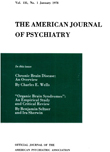The addict, abstinence, and the family
Abstract
The drug addict generally has an extremely difficult time terminating drug use and remaining abstinent. A partial explanation can be found in an investigation of the relative meaning of the drug for the addict within his social context rather than viewing the drug simply as a pharmacological agent. The idea that addiction is a social phenomenon within the addicts family suggests a relationship between the functioning of the families of addicts and their inability to tolerate abstinence. Because the abuse of heroin or barbiturates by one family member can result in "rewards" for all family members, the family, in behaving as if the addict cannot control his drug use, functions in such a way as to reinforce the addiction.
Access content
To read the fulltext, please use one of the options below to sign in or purchase access.- Personal login
- Institutional Login
- Sign in via OpenAthens
- Register for access
-
Please login/register if you wish to pair your device and check access availability.
Not a subscriber?
PsychiatryOnline subscription options offer access to the DSM-5 library, books, journals, CME, and patient resources. This all-in-one virtual library provides psychiatrists and mental health professionals with key resources for diagnosis, treatment, research, and professional development.
Need more help? PsychiatryOnline Customer Service may be reached by emailing [email protected] or by calling 800-368-5777 (in the U.S.) or 703-907-7322 (outside the U.S.).



